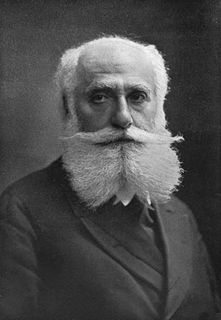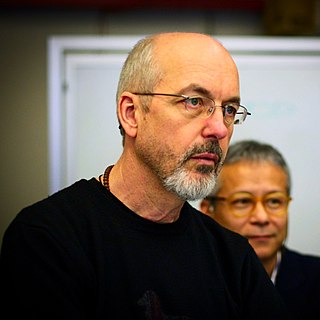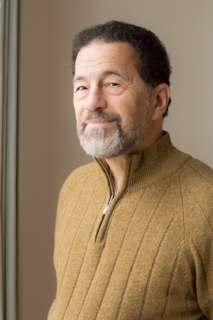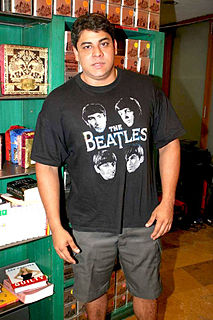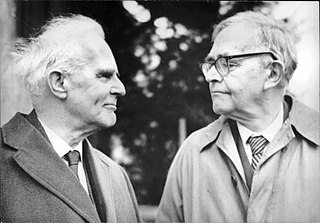Top 170 Persian Quotes & Sayings - Page 3
Explore popular Persian quotes.
Last updated on December 18, 2024.
...by serving as the dominant power in the Gulf, WE maintain a 'stranglehold' over the economies of other nations. This gives us extraordinary leverage in world affairs, and explains to some degree why states like Japan, Britain, France, and Germany - states that are even more dependent on Persian Gulf oil than we are - defer to Washington on major international issues (like Iraq) even when they disagree with us.
I always read the Latin American writers. I love so many of them: Gabriel García Márquez, José Donoso, Alejo Carpentier, Jorge Luis Borges, Clarice Lispector. I also love a lot of American experimental writers and surrealist European writers. But perhaps The Persian Book of Kings was the greatest influence - I encourage people to look at it. There is such a wealth of incredible stories.
We find collected in this book [The Bible] the superstitious beliefs of the ancient inhabitants of Palestine, with indistinct echoes of Indian and Persian fables, mistaken imitation of Egyptian theories and customs, historical chronicles as dry as they are unreliable and miscellaneous poems, amatory, human and Jewish-national, which is rarely distinguished by beauties of the highest order but frequently by superfluity of expression, coarseness, bad taste, and genuine Oriental sensuality.
The German huts, open on every side to the eye of indiscretion or jealousy, were a better safeguard of conjugal fidelity than the walls, the bolts, and the eunuchs of a persian harem. To this reason, another may be added of a more honourable nature. The Germans treated their women with esteem and confidence, consulted them on every occasion of importance, and fondly believed that in their breasts resided a sanctity and wisdom more than human.
Iraq does pose a serious threat to the stability of the Persian Gulf and we should organize an international coalition to eliminate his access to weapons of mass destruction. Iraq's search for weapons of mass destruction has proven impossible to completely deter and we should assume that it will continue for as long as Saddam is in power.
I was fascinated by the word 'Rudy,' which is connected to the Jamaican term 'rude boy,' which migrated from Jamaica to London. I was also fascinated by that name, because it exists in Persian culture and Iranian culture. There is actually a place called Rudy in Iran, and there's Iranians that I know with the name Rudy.
What the art historians had forgotten is that in Chinese, Japanese, Persian, and Indian art, they never painted shadows. Why did they paint shadows in European art? Shadows are because of optics. Optics need shadows and strong light. Strong light makes the deepest shadows. It took me a few years to realize fully that the art historians didn't grasp that. There are a lot of interesting new things, ideas, pictures.
Taj Mahal was built up by the Mughal Emperor Shah Jahan, who wanted his beloved wife to be remembered by one and all, with help of architectural geniuses like Ustad Isa, Isa Mohammad Effendi and Puru of Persia. The result that came across was a fine piece of Mughal architecture, fused with Persian, Islamic, and Indian architectural styles; or is believed so by many.
For the Persian poet Rumi, each human life is analogous to a bowl floating on the surface of an infinite ocean. As it moves along, it is slowly filling with the water around it. That's a metaphor for the acquisition of knowledge. When the water in the bowl finally reaches the same level as the water outside, there is no longer any need for the container, and it drops away as the inner water merges with the outside water. We call this the moment of death. That analogy returns to me over and over as a metaphor for ourselves.
The night of December 25, to which date the Nativity of Christ was ultimately assigned, was exactly that of the birth of the Persian savior Mithra, who, as an incarnation of eternal light, was born the night of the winter solstice (then dated December 25) at midnight, the instant of the turn of the year from increasing darkness to light.
While Leonidas was preparing to make his stand, a Persian envoy arrived. The envoy explained to Leonidas the futility of trying to resist the advance of the Great King's army and demanded that the Greeks lay down their arms and submit to the might of Persia. Leonidas laconically told Xerxes, "Come and get them.
Strifes will arise through the period. Watch for them near the Davis Strait in the attempts there for the keeping of the life line to land open. Watch for them in Libya and in Egypt, in Ankara and in Syria, through the straits about those areas above Australia, in the Indian Ocean and the Persian Gulf.
Using overwhelming air power to utterly and completely destroy ISIS. To put things in perspective, in the first Persian Gulf War, we launched roughly 1,100 air attacks a day. We carpet bombed them for 36 days, saturation bombing, after which our troops went in and in a day and a half mopped up what was left of the Iraqi army.
You see, Greg, my mother is going through a feline phase. Blinky is a Persian,' Hale said simply, as if that should explain everything. 'Binky has a nasty habit of shedding all over the living room furniture, you see.' Gregory Wainwright nodded as if he understood perfectly. 'And so we had to get new living room furniture, which, unfortunately, does not go with the Monet.' Kat stood there for a moment, staring into that small window of the world where someone would tire of a Monet simply because it clashed with the couch.
If one doubts whether Grecian valor and patriotism are not a fiction of the poets, he may go to Athens and see still upon the walls of the temple of Minerva the circular marks made by the shields taken from the enemy in the Persian war, which were suspended there. We have not far to seek for living and unquestionable evidence. The very dust takes shape and confirms some story which we had read.
Although extraordinary valor was displayed by the entire corps of Spartans and Thespians, yet bravest of all was declared the Spartan Dienekes. It is said that on the eve of battle, he was told by a native of Trachis that the Persian archers were so numerous that, their arrows would block out the sun. Dienekes, however, undaunted by this prospect, remarked with a laugh, 'Good. Then we will fight in the shade.
Ernest once told me that the word paradise was a Persian words that meant walled garden. I knew then that he understood how necessary the promises we made to each other were to our happiness. You couldn't have real freedom unless you knew were the walls were and tended to them. We could lean on the walls because they existed; they existed because we leaned on them.
The irony is that Iraq actually has one of the richest and most sophisticated cuisines in the world. So many classic American or European foods - ceviche, albondigas, even the mint julep - have roots in Iraqi cuisine, which was a crossroads of Persian and Arab and Turkic traditions. The oldest written recipes in the world are from Iraq!
Trump's tendency is to rub shoulders with dictators. We have seen this with his attitude toward Russia and also toward the present dictatorship in Egypt. He might start to cozy up to the Gulf dictators as a way of trying to scare the Iranians. This could lead to a naval confrontation in the Persian Gulf.
Thank you very much for contacting me to express your support for the actions of President Bush in response to the Iraqi invasion of Kuwait. From the outset of the invasion, I have strongly and unequivocally supported President Bush's response to the crisis and the policy goals he has established with our military deployment in the Persian Gulf.
My guess is that Trump will begin withdrawing troops from Europe at a slow pace. He will demand a renovation of the Iran Accord and get nowhere with this. There might be more US sanctions on Iran. However, the Iranians will not compromise with Trump, and barring a naval confrontation in the Persian Gulf, it will be US businesses that will suffer and Trump's frustration level that will go up.
We have never said that the fight against the Iranian aggression and against the expansionist Persian tendencies (which have been demonstrated by various means under successive regimes in Iran) is the decisive battle for the Arabs. What we have said, and still say, is that the fight against Zionism is the main decisive battle for the Arabs. This is a great objective reality, which cannot be denied or underestimated except by someone who would not only harm the Arab nation and its main causes, but would also overlook the main danger.
Good housewives all the winter's rage despise, Defended by the riding-hood's disguise; Or, underneath the umbrella's oily shade, Safe through the wet on clinking pattens tread, Let Persian dames the unbrella's ribs display, To guard their beauties from the sunny ray; Or sweating slaves support the shady load, When eastern monarchs show their state abroad; Britain in winter only knows its aid, To guard from chilling showers the walking maid.
In the 1950s, Pakistan allied with the United States in something called the Central Treaty Organization. We were lined up with, at that time, Iran, ruled by the Shah, and Pakistan and Turkey as a southward shield against Soviet expansion toward the warm waters of the Indian Ocean and the Persian Gulf. It was part of the containment strategy.
Now, the Iranian people are a great people, and Persian civilization is a great civilization. Iran has acted in ways that's not conducive to peace and prosperity in the region: their threats against Israel; their pursuit of a nuclear weapon which could potentially set off an arms race in the region that would make everybody less safe; their support of terrorist organizations in the past - none of these things have been helpful.
Iraq both poses a continuing threat to the national security of the United States and international peace and security in the Persian Gulf region and remains in material and unacceptable breach of its international obligations by, among other things, continuing to possess and develop a significant chemical and biological weapons capability, actively seeking a nuclear weapons capability, and supporting and harboring terrorist organizations.
I think it's only in a crisis that Americans see other people. It has to be an American crisis, of course. If two countries fight that do not supply the Americans with some precious commodity, then the education of the public does not take place. But when the dictator falls, when the oil is threatened, then you turn on the television and they tell you where the country is, what the language is, how to pronounce the names of the leaders, what the religion is all about, and maybe you can cut out recipes in the newspaper of Persian dishes.
Jalaluddin Rumi is completely rooted in Islamic teachings of Quran. He was a great scholar, he belonged to a madrassa, and he knew Islamic theology and jurisprudence very well. He knew Persian, Arabic and Turkish, which was coming into Anatolia at that time, very well. He was a remarkable, remarkable scholar, besides being a great saint.
I don't care about the internal political system of the United States. I want to be a friend of United States, of its baseball, its institutions, its rock and roll, its workers, and its technology because we need it. I want to be friends of the Arab people, of the Persian people, of the Asian people.
When our sailors in the Persian Gulf accidentally strayed into Iranian waters, that could have sparked a major international incident. Some folks here in Washington rushed to declare that it was the start of another hostage crisis. Instead, we worked directly with the Iranian government and secured the release of our sailors in less than 24 hours.
I came from an educated, upper middle-class family. My mother was a Persian and history teacher at a large high school for girls. Many of the women in my extended family and in our circle of friends were professionals. In those days, women were a vital part of the economy in Kabul. They worked as lawyers, physicians, college professors, etc., which makes the tragedy of how they were treated by the Taliban that much more painful.
We stand today at a unique and extraordinary moment. The crisis in the Persian Gulf , as grave as it is, also offers a rare opportunity to move toward an historic period of cooperation. Out of these troubled times, our fifth objective - a new world order - can emerge: a new era - freer from the threat of terror, stronger in the pursuit of justice, and more secure in the quest for peace. An era in which the nations of the world, East and West, North and South, can prosper and live in harmony.
The climate, financial and national security crises are all connected. They share the same cause: Our [the USA's] absurd dependency on foreign oil. As long as we need to spend billions of dollars each year to buy foreign oil from state-run oil companies in the Persian Gulf, our problems of a trade deficit, a budget deficit and a climate crisis will persist.
By accident of geography, the world's major oil resources are in Shi'ite-dominated areas. Iran's oil is concentrated right near the gulf, which happens to be an Arab area, not Persian. Khuzestan is Arab, has been loyal to Iran, fought with Iran not Iraq during the Iran-Iraq war. This is a potential source of dissension. I would be amazed if there isn't an attempt going on to stir up secessionist elements in Khuzestan.
I call on the Iranian people: it is not too late to replace the corrupt regime and return to your glorious Persian heritage, a heritage of culture and values and not of bombs and missiles... How can a nation allow a regime to instill fear, take away the people's freedom and shock the young generation that seeks its way out of the dictatorial Iran.
The Iranian government has become pretty open about the drug problem in recent years. Opium use is a very traditional, cultural thing in Iran, so the government is actually more open about it than they are about some of the other ills in society. They just don't want to talk about things that might relate to a Western lifestyle even though they know that Iranians indulge. Because there is no real public life left in Iran - people go and have dinner and then everything retreats behind these Persian walls.
If we want energy security, then we have to reduce our appetite for fossil fuels. There's no other way. Other issues may crowd the headlines, but this is our fundamental challenge. Big challenges require bold action and leadership. To get the United States off fossil fuels in this uneasy national climate of terrorism and conflict in the Persian Gulf, we must treat the issue with the urgence and persistance it deserves. The measure of our success will be the condition on which we leave the world for the next generation.
Like twentieth-century Iran, the remnant of the Persian Empire, Ethiopia under Haile Selassie attempted to preserve the absolutist state throught an accommodation with modernizing forces in his own terms without completely subduing traditionalists. This was not a strategy of Haile Selassie's own choosing. Instead, he was overtaken by events and forced to deal with contradictions that were from the very beginning too formidable to be managed in the long term.
Not specifically. "Demons have been on Earth as long as we have. They're all over the world, in their different forms – Greek daemons, Persian daevas, Hindu asuras, Japanese oni. Most belief systems have some method of incorporating both their existence and the fight against them. Shadowhunters cleave to no single religion, and in turn all religions assist us in our battle. I could as easily have gone for help to a Jewish synagogue or a Shinto temple, or – Ah. Here it is.
I was nurtured on Greek Mythology and the classical epics. I lived and breathed Homer. Other mythologies - the Russian, the Norse, the Persian, the Indian, Egyptian, etc. - all came later. First and foremost were the Greeks, and they were all living in my head as though I were Zeus and they were a clamoring Chorus of Athenas.
For the Platonic or Aristotelian philosophy, it is of no importance whether Plato or Aristotle ever lived. For the mystical practice of an Indian, Persian, Chinese, or Neo-Platonic mystic it is a matter of indifference whether Rama, Buddha, Laotse, or Porphyrius are myths or not. The mystic has no personal relation to them. It is not here a question of somebody telling me the truth which of myself I cannot find, but of my finding an access to the depths of the world in the depths of my soul.




